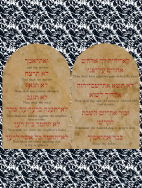The Eighth Commandment
Exodus 20:16; Deuteronomy 5:20
Thou shalt not bear false witness against thy neighbor.
TCR 321. “Bearing false witness against the neighbor,” or testifying falsely, means, in the natural sense nearest to the letter, to act the part of a false witness before a judge, or before others not in a court of justice, against one who is rashly accused of any evil, and to support the accusation by the name of God or anything else that is holy, or by oneself and by such things as belong to reputation of one’s name. In a wider natural sense this commandment forbids all kinds of lies and hypocrisies in civil life which look to an evil end; also criticizing and slandering the neighbor, to the injury of his honor, name, and fame, on which the man’s whole character depends. In the widest natural sense, the commandment forbids treachery, deceit, and premeditated evil against anyone, which spring from various sources, such as enmity, hatred, revenge, envy, rivalry, and the like. For these evils conceal within them the bearing of false witness.
TCR 322. In the spiritual sense, “bearing false witness” means to persuade that falsity of belief is true belief and evil of life is good of life, and the reverse, doing this from purpose, not from ignorance; that is, doing this after one has learned what is true and good, not before; for the Lord says:
If you were blind, you would have no sin; but now you say, We see; therefore your sin remains (John 9:41).
In the Word this kind of falsehood is called a “lie” and the intent is called “deceit,” as in the following passages:
We have made a covenant with death, and with hell we have made vision, for we have made a lie our trust, and in falsehood we have hid ourselves (Isa. 28:15).
This is a rebellious people, lying sons; they will not hear the law of Jehovah (Isa. 30:9).
From the prophet even to the priest, everyone works a lie (Jer. 8:10).
The inhabitants speak a lie; their tongue is deceitful in their mouth (Micah 6:12).
Thou wilt destroy those who speak a lie; Jehovah abhors the man of deceit (Ps. 5:6).
They have taught their tongue to speak a lie; their habitation is in the midst of deceit (Jer. 9:5, 6).
Because a “lie” means what is false, the Lord says: That when the devil speaks a lie, he speaks from his own (John 8:44) ....
TCR 323. In the celestial sense, bearing false witness means blaspheming the Lord and the Word, thus banishing truth itself from the church. For the Lord is the Truth itself, as He is likewise the Word. On the other hand, to bear witness in this sense means to speak the truth, and testimony means the truth itself. For this reason, the Decalogue is called the “Testimony” .... And because the Lord is the truth itself, He says of Himself that He bears witness, that the Lord is the very truth... and that He bears witness, and witnesses of Himself....
TCR 324. Those who speak falsities from deceit or purposely, uttering them in a tone that imitates spiritual affection (and still more if they mingle with them truths from the Word, which are thus falsified), were by the ancients called sorcerers (see Apocalypse Revealed, n. 462), also pythons, and serpents of the tree of the knowledge of good and evil. These falsifiers, liars, and deceivers may be likened to men who talk to those they hate in a mild and friendly manner, and while talking hold behind them a dagger with which to kill. They may also be likened to those who poison their swords and thus attack their enemies; or to those who mix hemlock with water, or who poison with new wine and sugar icing. They may also be likened to charming and seductive harlots infected with a malignant contagious disease; to stinging shrubs, which when brought near to the nostrils, hurt the olfactory fibers; to sweetened poisons; and also to dung, which when dried emits in autumn a fragrant odor. Such are described in the Word by leopards (see Apocalypse Revealed, n. 572).
Questions and Thoughts for Reflection
- Gossip is probably the most common form of bearing false witness. How do we distinguish false, evil gossip from information shared out of concern for someone in trouble?
- TCR 321 says (halfway down): “In a wider natural sense this commandment forbids all kinds of lies and hypocrisies in civil life which look to an evil end.” Does this imply that white lies, not for an evil end, are okay?
- TCR 322: The differences between the spiritual sense of this commandment and the commandment against theft seem subtle. These two commandments are closely related. What makes deceit so dangerous is that we use self-deceit to excuse and confirm evils that we may have done rashly and might otherwise repent of. (AC 9013 is a scary passage on this.)
- How can we help our children delay the onset of lying? How can we avoid setting them bad examples in discipline, etc.?
- Flattery and too much praise is another form of deceit, dangerous both to the flatterer and the person flattered. When is praise useful and when it is not?
| previous |  |
next |
|---|


